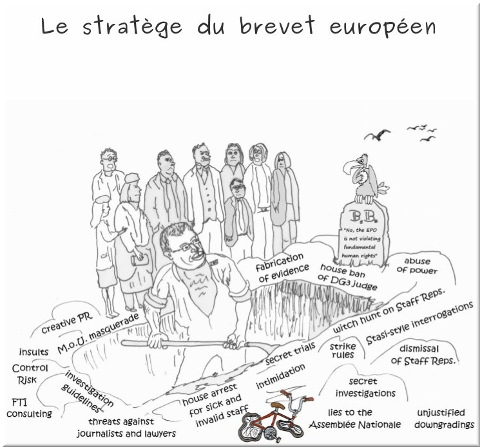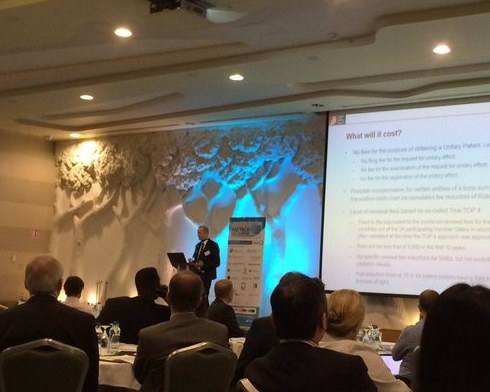06.23.16
Looks Increasingly Plausible That Battistelli is Covering up Bogus and/or Illegally-Obtained ‘Evidence’ From the EPO’s Investigative Unit

Summary: Why we believe that Benoît Battistelli is growingly desperate to hide evidence of rogue evidence-collecting operations which eventually landed himself — not the accused — in a catastrophic situation that can force his resignation
EARLIER this month there was an EPO ‘trial’ against a judge, as previously covered in [1, 2, 3, 4, 5, 6]. It’s not really a trial because in Eponia there is no real justice and no real courts. It’s just a monarch’s execution den, where largely bogus (or exaggerated if no cherry-picked) charges are brought up and then used mercilessly in spite of what's supposed to appear like a jury (it’s being ignored by the monarch, Battistelli, who is typically an omnipotent accuser, plaintiff, judge, jury and executioner).
In our previous posts on this subject we ended up mentioning not only the illegality of the surveillance but also the possibility of Parallel Construction (details in this recent post about IP Kat censorship of comments).
Now we have a translation of this original German report from Mathieu Klos. We got a translation as it was published in SUEPO’s Web site and we made an HTML version of it. The more important (or original) bits are highlighted in yellow below:
Coup at the EPO: Battistelli intervenes in dismissal proceedings
The Enlarged Board of Appeal of the European Patent Office (EPO) yesterday put an end to proceedings for the dismissal of a suspended judge, by refusing to reach a decision. The dismissal had been prompted by the Administrative Council, but a coup was scored on the first day of the oral hearing when EPO President Benoît Battistelli intervened beforehand in the independent disciplinary proceedings by demanding that the public be excluded. A lot of people watching developments see this as an attack on the independence of the court.
Benoît Battistelli
Even before the proceedings got under way, there had been a major conflict among the people concerned about holding a public hearing in the dismissal proceedings. The Enlarged Board of Appeal had ultimately decided to act in public, in line with the petitions by the suspended judge and his attorney Senay Okyay.
According to Okyay, last Monday the Chair of the Administrative Council Jesper Kongstad raised the issue of the proceedings being held in public. The Administrative Council is the
disciplinary body for all EPO judges.Last Friday the Enlarged Board of Appeal received a letter from EPO President Battistelli. He had arranged for the suspension of the judge, but was not taking part in the dismissal proceedings. “In the letter Battistelli demanded that the hearing be held behind closed doors”, says Okyay, the attorney. “The President is maintaining that a public hearing is contrary to the statutes of the Office.” Okyay also says that further questioning of witnesses, as the court had in fact scheduled for three days of the proceedings, from 14 to 16 June, is being regarded by Battistelli as “inappropriate”. The President accordingly would not authorise the presence of witnesses from the Office. The court had planned to question three witnesses from the Office’s own investigation unit.
According to a number of observers, however, yesterday’s planned oral hearing did not in fact happen. A few minutes after the start the court excluded members of the public, so as to inform the parties of Battistelli’s letter and the concerns it raised.
Battistelli’s letter causes confusion among the judges
Again according to Okyay, the judges regarded the letter as interference with their independence of action. They demanded that the representatives of the Administrative Council at the proceedings obtain a response from the supervisory body as whether its members shared the President’s interpretation of the legal situation or not, but the reply was somewhat ambiguous.
The Enlarged Board of Appeal yesterday informed the participants that it regarded the letter as a massive exertion of influence on its independence, according to observers. The fact that the Administrative Council had not unambiguously distanced themselves from the letter caused the court to terminate the proceedings, without issuing the proposal needed in order for the judge to be dismissed.
It also remains unclear whether there would have been a normal course of the proceedings at all. Okyay says that “the Administrative Council actually cannot now decide on the dismissal of my client at their next meeting. According to the statutes, my client should be reinstated in office with his reputation and dignity intact. The Administrative Council now only has recourse to disciplinary measures such as a reprimand or censure.”
Battistelli himself did not make any comment on the accusations in response to an enquiry from JUVE. The EPO pointed out that the Administrative Council is the body responsible for appointments and disciplinary procedures. And to protect the integrity of the proceedings, and of all the parties concerned, the disciplinary proceedings are confidential – according to the rules of the EPO.
Highly explosive proceedings
The dispute about the suspended EPO judge has been smouldering for the last year and a half. In December 2014 Battistelli imposed a ban on the judge entering the EPO premises. This decision came in for a lot of criticism among the European patent community, who saw it as a threat to the independence of the Board of Appeal.
A good year later, in October 2015, the Administrative Council initiated the dismissal proceedings against the judge. Since the establishment of the Office in the 1970’s, no proceedings like this have ever been attempted. According to EPO regulations, however, the dismissal of a judge is only possible on the recommendation of the Enlarged Board of Appeal.
By taking this step, however, the Administrative Council was not following Battistelli’s proposal, who had tried for a direct dismissal. According to sources close to the Board of Appeal, the EPO President was under the threat at yesterday’s hearing of questions being raised also about the internal investigation into the events. This would have thrown up the matter of whether there was truth in the reports that publicly accessible computers at the EPO had been monitored. The Administrative Council had already been insisting that the investigations and disciplinary proceedings were being handled correctly.
Struggle for the independence of the EPO court
A good number of the observers see the letter from Battistelli as being further proof of his interfering in matters which concern the court. At the forthcoming meeting on 29 and 30 June the Administrative Council will be deciding on a package of reforms aimed at greater independence for the Boards of Appeal.
For a good two years now, the Office has been confronted by a vociferous public debate, in which criticism has been increasingly sharply levelled against too close an amalgamation between the Office management and the EPO court. The actual aim of the Boards of Appeal is to examine the decisions by the patent authority, such as the issue of European patents. In May 2014, however, the court declared that its own president was proving an embarrassment with excessively close links to the EPO management, and set a laborious reform process in motion. A number of proposals for solutions have so far remained without result. The only thing that is clear is that the 38 Member States of the European Patent Organization really do not want the court to part company from the Office.
In the light of yesterday’s events, however, whether the Administrative Council will now in fact, as planned, decide on the reforms at the end of June, is entirely in the lap of the gods.
(Mathieu Klos)
From the above we learn quite a few things, including the reasons for Battistelli’s phobia. It sure looks like he’s hiding something from the public for fear of backlash. It has nothing whatsoever to do with the integrity of the process as the accused and his representatives sought transparency, the board wanted transparency, and the names of Investigative Unit staff are mostly public knowledge by now [1, 2, 3, 4, 5, 6, 7]. Battistelli and his goons are most likely worried that defamation of the accused will be more widely realised, challenging the narrative which Team Battistelli ‘planted’ in the Dutch and German media just weeks after signing the FTI Consulting 'crisis control' contract (later paid specifically for Dutch and German propaganda).
Battistelli is digging his own grave these days. He’s doing a fine job. █





















 Content is available under CC-BY-SA
Content is available under CC-BY-SA